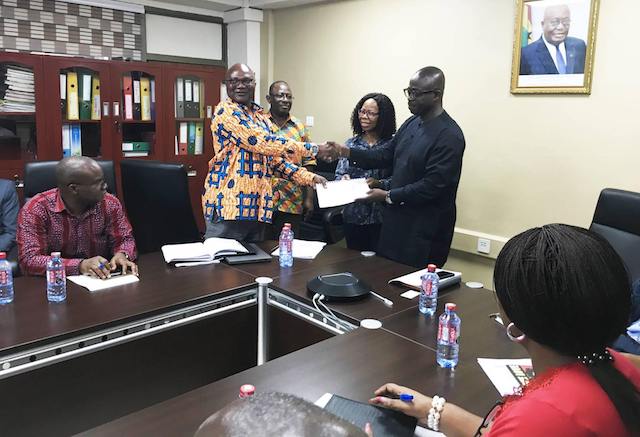|
Getting your Trinity Audio player ready...
|
Ghana’s Renewable Energy Master Plan has been officially presented to the Ministry of Energy by the Energy Commission.
The Master Plan constitutes an investment-focused framework for the development and promotion of the country’s rich renewable energy resources to propel economic growth, improve social life and reduce climate change effects.
The plan, when implemented, is expected to help the country achieve the following targets by 2030: increase the penetration of renewable energy in the national energy generation mix from the 2015 baseline of 42.5 MW to 1363.63 MW (with grid connected systems totalling 1094.63 MW); reduce the dependence on biomass as main fuel for thermal energy applications; provide renewable energy-based decentralized electrification options in 1,000 off-grid communities; and promote local content and local participation in the renewable energy industry.
Receiving the Master Plan from the Executive Secretary of the Energy Commission, Dr. Alfred Ofosu Ahenkorah, the Deputy Minister of Energy in charge of Power, William Owuraku Aidoo (MP), expressed the Ministry’s appreciation to the technical team that developed the plan and thanked UNDP for providing technical and financial support.
He assured that the “Ministry would make all efforts to facilitate the presentation of the plan to Parliament for approval to secure the country’s commitment for its implementation in the long term”.
In a remark on behalf of the United Nations Development Programme (UNDP), Ms. Gita Welch, the acting Resident Representative, observed that though Ghana has made significant efforts to put in place the enabling environment to scale up investments in the renewable energy sector, the Master Plan offers the country the opportunity to put in place the necessary implementation framework towards the promotion of the renewable energy sector.
“The Sustainable Development Goals (SDGs) particularly SDG 7 aims to ensure access to affordable, reliable, and modern energy for all by 2030. The Renewable Energy Master Plan is a blue print and its implementation is critical for the achievement of the SDG 7 in Ghana”, noted Ms. Welch.
In a presentation delivered by Mr. Eric Antwi-Agyei, Project Coordinator for the UNDP/Energy Commission Renewable Technology Transfer project, he highlighted the clear targets and strategies outlined in the plan to increase the renewable energy installed capacity of the country.
Among the strategies, the plan aims to support the private sector through concessional financing and government on-lending facilities for renewable energy investments. It will also boost and sustain local assembling and manufacturing of renewable energy technologies, as well as develop legislation to ensure that increased development of renewable energy projects will not affect the environment.
In addition, the plan focuses on the integration of renewable energy into the national energy mix to ensure security of energy supply, ensure a cleaner environment, and help mitigate climate change.
The development of the Renewable Energy Master Plan forms part of a broader set of initiatives under the Danish Government funded project dubbed “China-Ghana South-South Cooperation Renewable Energy Technology Transfer”. This initiative is a collaboration between the Government of Ghana represented by the Energy Commission, the Ministry of Science and Technology in China and the UNDP Country Offices in Accra and in Beijing, which is promoting renewable energy technologies in Ghana with emphasis on private sector development and inclusion.
The Ghana Renewable Energy Master plan was developed by a local technical team made up of representatives of the Ministry of Energy, Energy Commission, National Development Planning Commission, Academia and chaired by Mr. Wisdom Ahiataku-Togobo, Director of Renewable and Alternate Energy of the Ministry.





